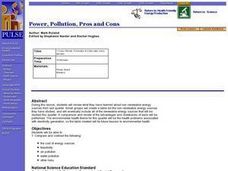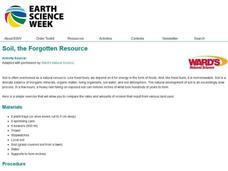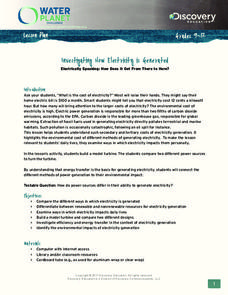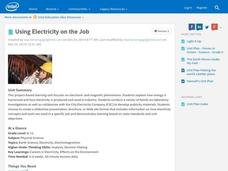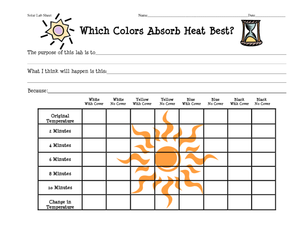Curated OER
Thinking about Energy
Young scholars examine their understandings about energy concepts by completing an online survey. Students participate in a class discussion about their uses of resources and the differences between perpetual, renewable, and...
Curated OER
Discover How Trees Produce and Conserve Energy
Students discover the flow of energy from plants to humans, the importance of this and how the energy chain is effected. In this informational lesson students will see how energy is produced and conserved by trees and how it can be...
Curated OER
Home Energy Audit: Electrical Production Worksheet
In this energy production worksheet, learners describe the difference between renewable and nonrenewable energy and identify the different types of energy. This worksheet has 1 short answer, 1 matching, and 1 problem to solve.
Curated OER
Energy Source Puzzles
Students identify renewable and nonrenewable resources. In this energy source instructional activity, students participate in a game to identify the various types of resources. There are various extensions to this instructional activity,...
Texas State Energy Conservation Office
Fueling the Future
Future mechanical engineers and automotive technicians read about various solutions to using gasoline in cars. Included are electric, fuel-cell-powered, and hybrid vehicles.
Teach Engineering
Building a Piezoelectric Generator
In pairs, learners build a piezoelectric generator from readily available electric components in the second and final installment of the two-part series. Tapping the piezoelectric element produces enough electricity to light an LED....
It's About Time
Energy from Coal
If plastic is derived from fossil fuels and fossil fuels come from dead dinosaurs, does that mean that plastic dinosaurs are made from real dinosaurs? This lesson goes into depth about coal and other fossil fuels. First the instructor...
Curated OER
Power, Pollution, Pros and Cons
Students review what they know about non-renewable energy, compare and contrast advantages and drawbacks of each type, such as cost of energy sources, feasibility, air pollution, water pollution, and other risks, and create table listing...
Curated OER
Applied Science - Built Environment (2) Pre Lab
Second graders review how our society affects nature. In this energy lesson, 2nd graders discuss the different ways that energy is collected. They review renewable and nonrenewable energy sources.
Curated OER
Wise Use of Our Resources
In this resources worksheet, students will categorize 10 resources as either a renewable or nonrenewable resource. Students will then complete 2 short answer questions.
Curated OER
Soil, the Forgotten Resource
Students discuss soil understanding that is is often overlooked as a natural resource. In this science lesson, students recognize that we depend on it for energy in the form of foods. Students experiment with six boxes of soil to help in...
Curated OER
Chemistry: Renewable and Nonrenewable Energy
Students research on renewable and nonrenewable resources. For this chemistry lesson, students design and build solar panels. They evaluate their device and write a lab report.
Curated OER
Forms of Energy
Fifth graders brainstorm what forms of energy are used in an energy bike listing them on the board with the description placed beside each form for reference. They work in pairs to diagram the energy transformations that occurred while...
Curated OER
Auditing the Energy-Guzzlers in Your Home
Students identify the energy sources in their community as renewable or non-renewable resources. Using their homes, they identify the types of energy they use to heat and power it. They calculate the amount of electricity used by each...
Curated OER
To Renew, or Not to Renew
Students explore the various types of renewable energy. After reading articles, they discover the advantages and disadvantages of renewable energy. They also explore the challenges to switch over to using more and more renewable energy...
Beyond Benign
Synthesis and Analysis of Biodiesel
Fossil fuels are non-renewable resources and have become crucial to the livelihood of countless individuals. Young chemists investigate an alternative method of generating energy by performing a series of activities that lead to the...
Scholastic
Study Jams! Natural Resources
Use this slide show to introduce your class to some of our most useful natural resources. The text beneath the photographs differentiates between renewable and non-renewable resources. The need for conservation of resources and human...
Curated OER
Forest Products
Students study forests and understand their reliance on forest products and examine their choices between renewable and non renewable resources. In this forest products lesson plan students read several articles, complete a short...
Curated OER
Power In Variety
Learners discover different types of energy. In this energy source lesson students compare different types of energy, renewable and nonrenewable. Learners answer questions about the different types of energy and their impact on the...
EarthEcho International
Investigating How Electricity is Generated
What is the real cost of electricity? The real cost is not just the price you pay, but the environmental and economic costs as well. Scholars build, use, and judge the effectiveness of a turbine. They also investigate the environmental...
Intel
Using Electricity on the Job
Learners explore electricity, discussing its importance and researching different ways in which electricity can be generated. Groups present their findings to the class and then create publicity materials which promote and educate about...
Curated OER
Cooking with the Sun!
Students access prior knowledge of solar energy and understand that solar energy produces heat. In this solar cooker lesson, students complete grade appropriate experiments using the heat of the sun. Students complete a worksheet on...
Curated OER
Not Just a Corny Idea
Students explore ways in which ethanol can be created using alternate energy sources.
Curated OER
Eco Points Score Card
Students play a game in which points are assigned to daily activities which require fossil fuels or electricity. They compare the impact their energy and transportation choices have in everyday life.









